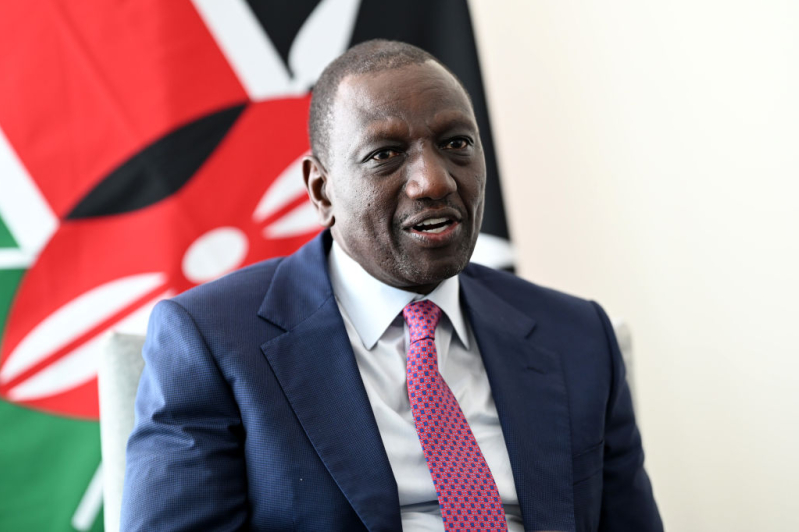
A section of evangelical leaders in Kenya have backed President William Ruto's plan to construct an 8,000-seat chapel within the grounds of State House, the official residence and office of the presidency in Nairobi. The initiative, which the President asserts is personally funded and an upgrade to existing makeshift worship facilities, has become a contentious point of national conversation, drawing both fervent support and widespread criticism.
The proposal got a boost on June 15, 2025 when President Ruto hosted bishops, pastors, and evangelists from the Federation of Evangelical and Indigenous Christian Churches of Kenya at State House. During the gathering, Bishop Samuel Ngacha robustly defended the church project, describing those who oppose it as "anti-Christ". He questioned the sincerity of critics, arguing that the establishment of a proper church at State House aligns with Kenya’s Christian heritage.
Ngacha pointed out that there were already two existing iron-sheet churches, one Catholic and one Protestant, and the President's intention is merely to upgrade these structures.
"If you see anyone who is against an altar, they must be anti-Christ," Ngacha stated, drawing on scripture to emphasize that good works done in God's name should not be hindered. The mainstream church associations such as the Evangelical Alliance of Kenya, the Kenyan Conference of Catholic Bishops or the National Council of Churches of Kenya were not present at the meeting.
Archbishop Jackson Ole Sapit of the Anglican Church of Kenya had earlier questioned the nature of the project, asking: “Will the president be the bishop or leader of this church, as we have seen him recently lead public prayers?” He further warned that the proposed chapel could “alienate religious minorities” seeing it as a “dangerous precedent” especially because the Muslims, Hindus, or Africa traditional religions have no similar facilities.
Catholic Archbishop Philip Anyolo of Nairobi called for clarity on the chapel’s purpose, suggesting that if it is a chaplaincy, it should be non-denominational to avoid sending a "wrong message about religious inclusivity in public institutions." Muslim leaders have also challenged President Ruto to build a mosque at State House if the intention is truly inclusive.
Critics, including legal experts, other religious leaders, and civil society groups, argue that the construction of a Christian church at State House blurs the line between faith and government, directly clashing with Kenya's constitutional commitment to secularism.
Article 8 of the Kenyan Constitution explicitly states that "there shall be no state religion," implying the government must maintain religious neutrality. A petition has already been filed in Kenya’s High Court with the matter scheduled to be heard on the July 24, 2025.
Opposition figures like Martha Karua have forcefully argued that State House is public land and that the President cannot use public or private financing to construct the church on public land stating, "Not your land, not your money to do as you please. Completely out of order."
President Ruto himself has been unwavering in his resolve, declaring, “I will not apologise to anyone for building a church. If the devil is angry, he can do what he wants.” He consistently maintains that the construction is entirely financed by his personal funds, stating, "I'm not using government money, I'm using my own money."
His assertion directly addresses a major public concern about the use of taxpayer money. The President has also expressed surprise at the widely reported Ksh1.2 billion cost ($9.2M), questioning how a church big enough for only three hundred people could amount to such a figure, especially when comparing it to an 11-story building estimated at Ksh350 million ($2.7M).
State House Chaplain, Benard Njagi, has also publicly clarified the project's scope and necessity. He stated that a budget of between Ksh20 million ($155,000) to 30 million ($233,000) would be sufficient for the project, a stark contrast to the higher figures circulating in media reports.
Njagi explained that he and other worshippers approached the President for the construction due to the dilapidated state of the current worship center, describing it as "very cold" and potentially harmful to children attending services, risking pneumonia. Notably, Njagi's proposal to the President requested financial assistance for the construction of a modern Anglican church, a Catholic worship center, and a mosque, indicating a desire for inclusive worship facilities within State House.
He emphasized that a new, modern church would also facilitate worship conferences and other important gatherings that the current structure cannot accommodate. The existing Anglican church was erected in 2020 with the assistance of former First Lady Margaret Kenyatta.
Despite this spiritual and official backing, the project has ignited a heated national debate. The Atheist in Kenya Society has termed the project "unconstitutional and exclusionary," accusing President Ruto of promoting Christian nationalism and vowing to pursue legal action.
Public outrage has also been fueled by the reported Ksh1.2 billion cost, with many Kenyans pointing to pressing national needs like schools lacking basic infrastructure, hospitals without essential supplies, and delayed funding for education. Concerns about transparency and potential financial mismanagement have also been raised, with some speculating that its location within State House might shield it from public oversight.
This is not the first time a proposal to build a church from a sitting President has caused controversy in Africa. In 2020, Ghana’s then President, Nana Akufo-Addo, had pledged to build a National Cathedral in Accra to honour God for his election victory. He said, “I made a pledge to almighty God that He was gracious enough to grant my party, the NPP, and I victory in the 2016 elections after two unsuccessful attempts, so I will help build a cathedral to his glory and honour.”
It later turned out that initial part of the $58m spent were public funds and the Cathedral lies incomplete and is now subject to corruption investigation by Ghana’s current President, John Dramani Mahama, who was re-elected for his second term in January 2025.






